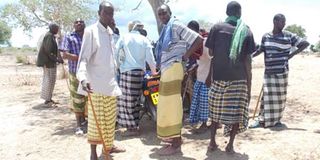Premium
Families in Lamu displaced by Shabaab threat appeal for food

Members of minority Boni community who have fled their villages due to Al-Shabaab threats. Families who fled from Ishakani Village in Lamu East and sought refuge in Kiunga Town for fear of being attacked by Al-Shabaab terrorists are facing acute food and water shortage. PHOTO | KALUME KAZUNGU | NATION MEDIA GROUP
What you need to know:
- The families fled from Ishakani leaving most of their valuables.
- Ms Fardiya Hamisi said life in Kiunga is difficult since they have no shelter.
- The villagers said they now have to dig up wild roots and gather wild fruits in bushes for survival
Families who fled from Ishakani Village in Lamu East and sought refuge in Kiunga Town for fear of being attacked by Al-Shabaab terrorists are facing acute food and water shortage.
The about 70 families fled Ishakani at the border of Lamu and terror-prone Somalia following the Sunday morning incident where about 100 heavily armed suspected Al-Shabaab militants stormed their village, gathered locals in one place and lectured them for over an hour.
Speaking to Nation on Tuesday, the mainly fishermen said they have nothing to eat or drink since they cannot do anything in Kiunga to earn a living.
The families fled from Ishakani, five kilometres away, leaving most of their valuables.
VILLAGE DESERTED
By Monday, the village was completely deserted.
They feared their properties in Ishakani will be looted if the government does not provide security.
They vowed never to go back to Ishakani until the government establishes police and Kenya Defence Forces (KDF) camps in the area.
“We have nothing to eat here in Kiunga. We depend on fishing for survival but since Sunday we haven’t been able to venture to the sea. I call on the government to assist us with food and water. We won’t go back to Ishakani until the government establishes KDF and police camps in our village,” said Mr Aboud Athman.
Another resident, Ms Fardiya Hamisi, said life in Kiunga is difficult since they have no shelter.
Ms Fardiya appealed to the county and national governments and well-wishers to come to the aid of residents.
SLEEPING IN THE COLD
“Life is difficult here. Most of us are putting up in neighbours’ houses while others are in the cold. Food and water is a challenge. We need urgent intervention,” said Ms Fardiya.
Meanwhile, residents of Bahamisi, Kiangwe and Pandanguo villages in Lamu County are appealing for relief food and water from the government and well-wishers after a drought spell left them with nothing.
All wells and boreholes which they depended on have so far dried up leaving them and their livestock reeling in thirst.
All crops have also dried up leaving them with no food.
WILD FRUITS
Speaking to journalists on Tuesday, the villagers said due to the tough situation, they now have to dig up wild roots and gather wild fruits in bushes for survival as they wait and hope that the county and national governments and even well-wishers will come to their aid.
Pandanguo Village headman Adan Golja urged the government to intervene and send relief food and other humanitarian aid to the drought-hit villagers.
Mr Golja said the over 2000 villagers of Pandanguo, all of whom are from the Boni minority community, are in dire need of food and water
The Boni community continues to suffer ever since the government cut out all relief help that was being offered to them after they were denied access to Boni Forest following the introduction of the ongoing Operation Linda Boni in 2015 whose objective is to flush out Al-Shabaab militants believed to be hiding inside the forest.
LINDA BONI
“We don’t have anywhere else to get our food or water apart from Boni Forest. When the Linda Boni operation kicked off, they asked us not to set foot in that forest or even go close to it until the operation is over.
“They also promised to give us food and all other relief help until the operation ends. They only did that for some months and then stopped and now we have nowhere to get food from.
“The few crops we tried planting have dried up because of the drought and so have the wells here. The situation is bad and we really need help,” said Mr Golja.
Villagers now have to trek for over 20 kilometres a day in search of food and water.
Mr Ali Gubo, another Boni elder, said in most cases, they rarely get any water or just get a little which is nt enough to cater for their needs.
On her side, Mrs Hanifa Suleiman, a resident of Bahamisi said over 50 families living in the village have been affected by the ongoing drought, more so following the drying up of wells and boreholes.





